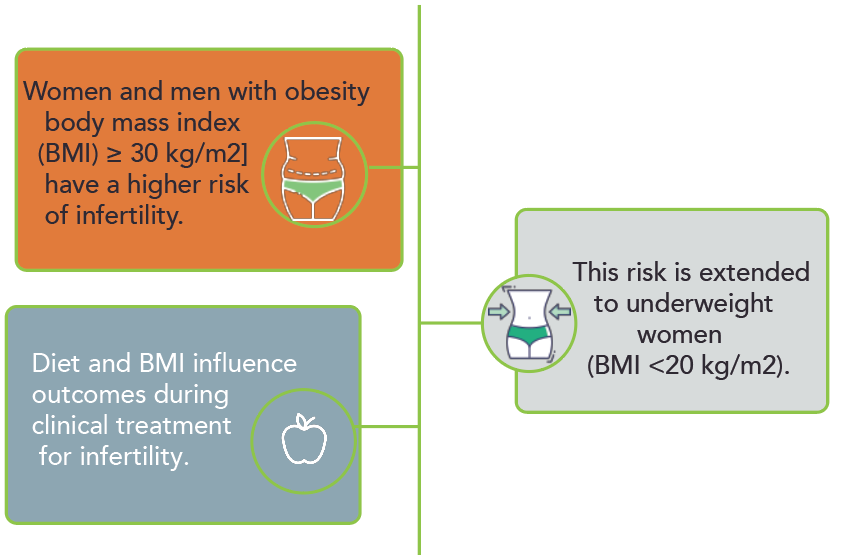Good nutrition is vital for a healthy body and reproductive system.
Studies have shown that eating a nutritious diet and making positive lifestyle changes can help boost fertility and prepare your body for pregnancy.

While current evidence on the role of dairy, alcohol, and caffeine is inconsistent; saturated fats and sugar have been associated with poorer fertility outcomes in women and men.
Women in the U.S. who belong to an underrepresented minority group, who have low income, or have low educational attainment, have significantly higher rates of infertility compared to women who are non-Hispanic whites, and have a higher income or have higher educational attainment.

Given the information above, it may be prudent to integrate nutritional counselling into both clinical guidelines for infertility, as well as national dietary guidelines for individuals of reproductive age. Studies on diet and reproductive health may enhance our ability to improve existing fertility programs across the U.S. and to deliver tailored care to women and men within at-risk groups.
Diets high in unsaturated fats, whole grains, vegetables, and fish have been associated with improved fertility in both women and men.
The Dietary Guidelines for Americans recommend a higher consumption of whole grains, monounsaturated or polyunsaturated oils, vegetables, fruits, and fish. Which has been associated with improved fertility results in women and higher semen quality in men.

Saturated fat content, which can be particularly high in red meat, has independently been linked to lower semen concentration in males. Polyunsaturated fats, conversely, have been shown to yield reproductive benefits in both men and women.
A cross-sectional study of men showed that a higher intake of omega-3 fatty acids was associated with significantly more favourable sperm morphology.
Also, women who consumed higher levels of omega-6, linoleic acid, and omega-3 had a higher incidence of pregnancy than those with lower intake of these nutrients.

In the NHS II, however, while no relationship was found between total intake of dairy products and risk of infertility. Results show that full-fat dairy products were associated with a lower risk of ovulatory infertility, while low-fat dairy products (including skim, 1%, and 2% milk, yoghurt, or cottage cheese) were associated with a higher risk.
Recommendations
- Eat Foods That Are Rich in Antioxidants
- Avoid Trans Fats Lower Carbs intake
- Eat Less Refined Carbs
- Eat More Fiber
- Combine Protein Sources
- Multivitamin
- Exercise
- Relax
- Healthy Weight
- Increase Your Iron Intake
- Avoid Excess Alcohol
References
. Moran LJ, Tsagareli V, Noakes M, Norman R. Altered preconception fatty acid intake is associated with improved pregnancy rates in overweight and obese women undertaking in vitro fertilisation. Nutrients (2016) 8:10. 10.3390/nu8010010 [PMC free article] [PubMed] [CrossRef] [Google Scholar]
Wise LA, Wesselink AK, Tucker KL, Saklani S, Mikkelsen EM, Cueto H, et al. . Dietary fat intake and fecundability in 2 preconception cohort studies. Am J Epidemiol. (2018) 187:60–74. 10.1093/aje/kwx204 [PMC free article] [PubMed] [CrossRef] [Google Scholar]
. Chavarro JE, Rich-Edwards JW, Rosner B, Willett WC. A prospective study of dairy foods intake and anovulatory infertility. Hum Reprod (2007) 22:1340–7. 10.1093/humrep/dem019 [PubMed] [CrossRef] [Google Scholar]
Food photo created by Racool_studio – www.freepik.com






